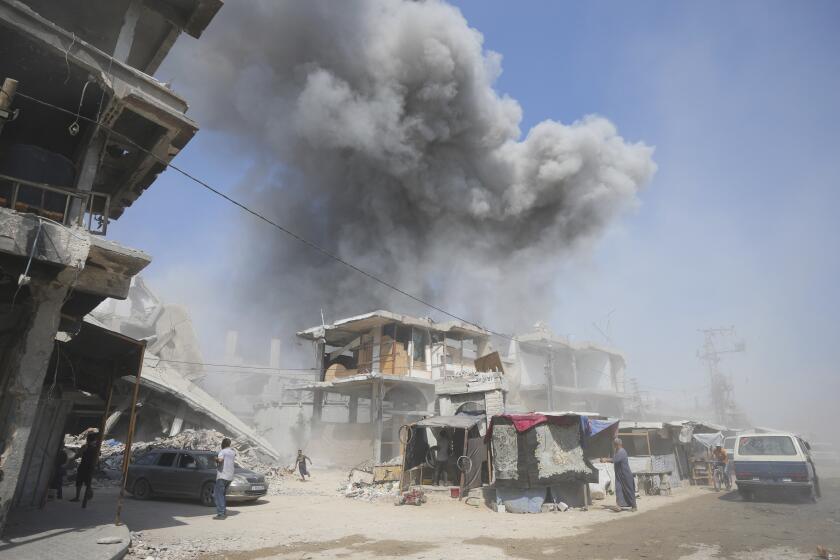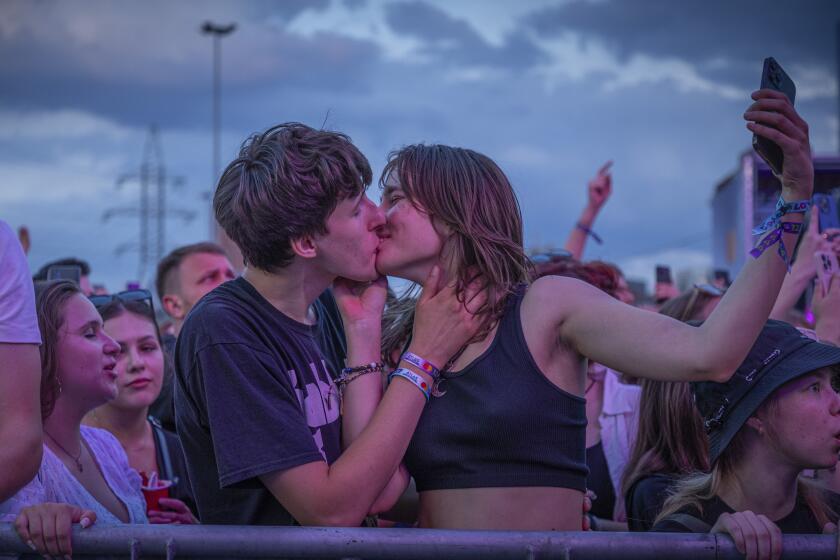Egypt’s Muslim Brotherhood mutes its religious message for protests
The medical students marched and sweated in protest.
“The fear is broken,” yelled Bahaa Mohammed. “We want freedom.”
“And Islam,” said his friend. “We need Islam.”
“Yes,” said Mohammed, hushing the young man. “But first freedom and the will of the people.”
The exchange in the streets of Cairo between the students, both members of Egypt’s Muslim Brotherhood, is a telling glimpse into the Arab world’s largest Islamic organization as it joins other opposition groups seeking to overthrow President Hosni Mubarak. The Brotherhood is muting its religious message amid a popular revolt that is not driven by Islam or politics.
The organization’s strategy became more apparent Sunday when it announced support for opposition leader and Nobel Peace Prize laureate Mohamed ElBaradei as a transitional president if the Mubarak government is toppled. The move was recognition that ElBaradei, a secularist with Western democratic principles, is the most potent symbol for change in a nation desperate for fresh voices.
“The revolution does not belong to any one group,” said Esam Shosha, a movement member. “We are one country. It’s not just about the Brotherhood, at least not now; it’s about all Egyptians.”
Whether that attitude survives in a post-Mubarak era is uncertain, but it suggests that after a week of uprisings the Brotherhood understands the emerging dynamics of Egypt. The organization, which runs religious and social programs across the country, believes that backing ElBaradei for now is the best chance to further its political ambitions.
“They don’t want to appear as if they’re using this revolt to seize power,” said Wahid Abdul Magid, an analyst at the Al Ahram Center for Political and Strategic Studies in Cairo. “What they want is free and fair elections to allow them to take power transparently. This would show their real popularity in the Egyptian street.”
The question is whether the organization’s religious agenda fits easily into an Egypt that is more tolerant and susceptible to Western-style liberalism and hip TV preachers. The Brotherhood’s beliefs are moderate when compared with many of the world’s more militant Muslim organizations. But it rejects the idea that a woman or a Christian could be president of a Muslim country, and would tilt the nation’s laws toward stricter Islamic codes. And it would certainly ban alcohol and topless beaches at the resort of Sharm el Sheik.
“The Muslim Brotherhood has always been a concern for secular and even religiously devoted Egyptians because of fear that their Islamic ideology could damage the country’s image and hurt tourism,” said Emad Gad, a political analyst.
Founded in 1928 by a teacher in the Nile Delta, the Muslim Brotherhood has had a history of bloodshed and intrigue in a nation where many have embraced its form of Islam while the government has labeled it a terrorist threat. Its radical wing was accused of attempting to assassinate President Gamal Abdel Nasser in 1954, and it has long supported the radical group Hamas in the Gaza Strip.
Estimated to have 600,000 members, many of them educated and middle class, the Brotherhood said it rejected violence decades ago. Its social and health programs have filled gaps in the state’s failing public services in this nation of 80 million people. During the 30 years under Mubarak’s rule, thousands of its members have been arrested. It has been further weakened by internal divisions over its role between religion and politics.
In 2005, after then-President George W. Bush urged Mubarak to allow freer elections, the Brotherhood won 20% of the seats in parliament. The result left Washington and Cairo worried that Islamic parties were on the rise across the region. The Egyptian government responded by purging the organization, culminating in the Brotherhood’s defeat in last year’s legislative elections, widely regarded as rigged by the ruling party.
The organization, politically isolated, debated strategies. Then in mid-December, the Tunisian uprising started, eventually forcing President Zine el Abidine ben Ali from office this month. A similar fervor ignited in Egypt, and the Brotherhood, careful not to officially endorse street protests for fear of another crackdown on its leaders, urged its young members into the streets alongside secular groups such as the April 6 movement.
It also asked its young rank and file to keep diaries of their thoughts on the gathering revolt. Their involvement in Tuesday’s protest drew accusations from Mubarak’s security forces that the Brotherhood was instigating violence and sedition. But by Friday, the organization, calculating that the president was vulnerable, sent thousands of its young and old members marching through Cairo, Suez and other cities.
“It was a revolution that started with young people with no political agenda. It was important for the Brotherhood to send its youth,” said group member Shosha, 31, whose cellphone holds videos of Egyptians who were beaten and shot during protests. “Our young members are probably more educated and more knowledgeable in demonstrations and how to handle police tactics.”
Mohammed Bedeir, a 23-year-old member, said: “We’ve been told to take part in the protest to pile the pressure on the regime. We’ve been telling the soldiers in the streets, don’t side with the government or at least don’t attack us. We’re asking them to stay in the middle and let us demonstrate.”
What surprised the Brotherhood and other traditional opposition groups was a protest movement without slogans, news releases and position papers. It came from the people, students and middle class at first, then swelling across economic and social lines. It has forced the organization to recalibrate its message in a world where the old boundaries have shifted.
That may not be easy.
“A Christian Copt or a woman cannot be president of a Muslim nation,” said Shosha, a broad-shouldered man, who sat in the Brotherhood’s headquarters in Cairo watching the protests on TV. “This is a religious point, not a political one. But it will be the Muslim leader’s role to protect the rights of Copts and women.”
Shosha said he was 12 when he befriended older Brotherhood members at a neighborhood mosque. Their message was to suffuse all aspects of life — job, family, politics — with Islam.
“Then I grew up and entered university, and I started thinking if the Brotherhood only wanted power it wouldn’t have lasted so long after all the state oppression against it since 1950s,” said Shosha. “It’s still here doing the work of God.”
Amro Hassan of The Times’ Cairo Bureau contributed to this report.
More to Read
Sign up for Essential California
The most important California stories and recommendations in your inbox every morning.
You may occasionally receive promotional content from the Los Angeles Times.







